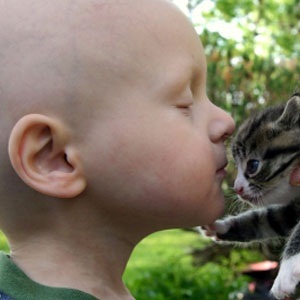
"People get cancer for a reason you know."
This gobsmackingly crass pronouncement was made to a friend (by a "friend") shortly after she'd been diagnosed with terminal breast cancer. Such cruel, pea-brained sentiments are, thankfully, not often expressed directly to a cancer patient's face, but they are pervasive nonetheless.
For more in this vein: watch: televangelist Pat Robertson advises forgiveness if you want to avoid cancer.
Even many of us who know on a cerebral level that it isn't true, we still believe, secretly in our heart of hearts, that somehow disease - and cancer especially - is our fault.
The consequence is that a diagnosis of malignancy, already traumatic, comes with an additional burden of guilt, even shame.
Why is this? Anyone who follows medical research news should realise that that doctors are still almost entirely in the dark as to why one person gets cancer while another is spared.
Yes, in a few cancers there's a clearly identified likely cause, but even those cases are intricately complicated by other factors. Smoking (one of the few unquestionably carcinogenic activities) increases your risk for lung cancer, but it's not the only factor. Many smokers don't get sick – hale centenarians puffing away attest to this.
The fear - blame connection
For the most part, we simply don't know the reason – which is perhaps why we concoct reasons when one of us gets cancer, or any disease whose cause is still a mystery. The tendency to blame the patient is based in fear: fear of our mortality, and fear of our lack of control over the course of events in a vast confusing universe.
When someone falls victim to what we fear – violent crime, a car accident, or a grave medical diagnosis – we look for reasons to make sense of it, and to gauge the likelihood that it will happen to us.
Beneath our empathy for the sufferer, is a more selfish, urgent need to know: "What did they do wrong? If I can figure that out then maybe I can stay safe."
Black humours and Big C personalities
One of the more damaging myths that persists is that getting cancer in the first place, and failing to fight it successfully, are products of an unwell psyche.
This idea has been knocking around since antiquity: The Father of Medicine himself, Hippocrates, thought cancer was caused by an excess of black bile, one of the "humours" in the body associated with a melancholic, despondent temperament.
The physician-philosopher Galen in 200 AD concurred, noting that women who were prone to melancholy were more likely to get cancer than their sanguine (i.e. hopeful and upbeat) sisters.
Over the centuries, this conviction that our psychological makeup causes cancer has refused to die. The idea that repressing sadness and anger and mismanaging stress somehow generates tumours has been especially popular in the twentieth century and into the twenty-first.
It's even been suggested that there's a cancer-prone, or "C-type" personality, along the lines of the (equally dodgy) A-type personality theory, proposed in the 1950s as a causative factor for
Mind-body conversations
We can't entirely discount that there may be something to this line of thought. Medical science learns increasingly just how integrated the mind and body are: each affects the other.
Mind does have certain mastery over the matter of our bodies -- just think of tears forming when we're sad, or a blush when we're embarrassed.
But the physiological mechanism of how emotions affect the rest of the body, and the extent this may contribute to disease, is a very new frontier of research.
At this point, the evidence is simply not sufficient to say with certainty that feelings have any effect on the cause or course of cancer. There've been tantalising studies that do suggest a significant link -- but equally plenty that show none. We have no right to jump to conclusions about this, and even less right to blame cancer patients that it's their poor psychological performance that's to blame.
Where our psychology can potentially lower risk for cancer is in making healthier life choices based on reliable research findings: eat your vegetables, exercise, avoid certain environmental factors like asbestos and UV rays, and avoid certain infections like HPV.
But even then, not enough is known about causative factors and how they interact to make it reasonable to beat oneself up about eating jam doughnuts instead of broccoli. Broccoli eaters get cancer too.
Cancer is bad luck, not punishment for bad behaviour.
In the early nineteenth century, before the TB bacillus was discovered, it seemed to make sense that TB was caused by bad air. (Another popular idea was that TB patients drained the life out of family members like vampires). They weren't wrong that poor ventilation can exacerbate spread of the disease, but the actual cause was very different.
The actual causes of cancer (which is over 200 diseases, not just one like TB) will almost certainly turn out to be multiple and highly complex. Until we understand these (and maybe even when we do) we need to accept that our powers to prevent cancer are limited – and, most importantly of all, when it is diagnosed, that we certainly didn't have the power to cause it.
Read more:
National anti-stigma cancer campaign
Men need vaccine against anal warts, cancer




 Publications
Publications
 Partners
Partners













